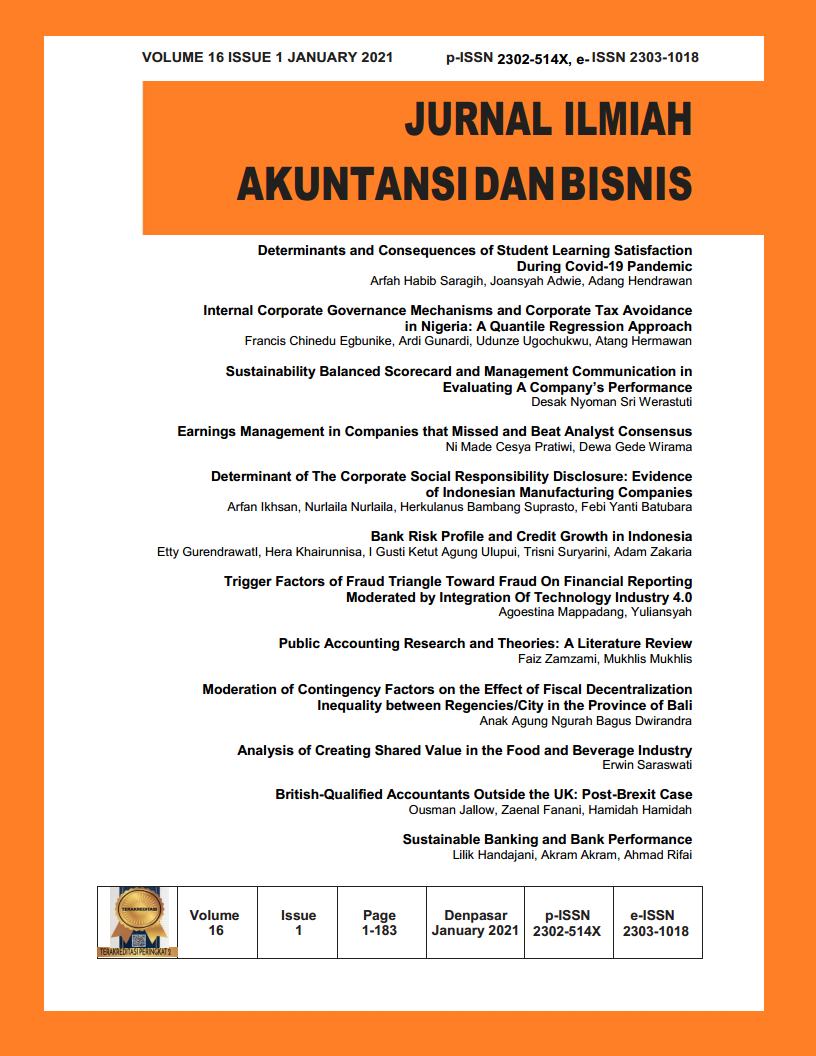Earnings Management in Companies that Missed and Beat Analyst Consensus
Abstract
The aim of this study is to analyze the differences of earnings management between companies that missed and beat analyst consensus. Nonfinancial companies listed in the Indonesia Stock Exchange in 2017–2018 and have analyst consensus data available are used as the research sample, which consist of 28 companies observed for four quarters. The final sample in the analysis consists of 94 observations (firm-quarters). The independent sample t-test is used for data analysis. Results show that companies that missed analyst consensus have greater discretionary accrual than the group of companies that beat analyst consensus. Therefore, differences in earnings management between companies that missed and beat analyst consensus exist. Companies that missed analyst consensus are more inclined to conduct earnings management in the following period. This finding opens the possibility to develop a new hypothesis in the positive accounting research framework.
Keywords: Analyst Consensus; Missed and Beat; Earnings Management.
Downloads
References
Arieza, U. (2019). Menyoal Laba BUMN yang Mendadak Kinclong. CNNIndonesia.
Astari, A. A. M. R., & Suryanawa, I. K. (2017). Faktor-Faktor Yang Mempengaruhi Manajemen Laba. E-Jurnal Akuntansi Universitas Udayana, 20(1), 290–319.
Astika, I. B. P. (2010). Manajemen Laba Dan Motif yang Melandasinya. Jurnal Ilmiah Akuntansi Dan Bisnis, 5(1), 1–15.
Audriene, D. (2018). Di Bawah Ekspektasi, Laba Kuartal I Indosat Turun 19.9 Persen. CNNIndonesia.
Baridwan, Z. (2000). Perkembangan Teori dan Penelitian Akuntansi. Jurnal Ekonomi Dan Bisnis Indonesia, 15(4), 486–497.
Barkhordar, M., & Tehrani, R. (2015). Investigating The Effect of Free Cash Flow, Dividend and Financial Leverage on Earnings Management in Listed Companies in Tehran Stock Exchange. International Journal Of Humanities and Cultural Studies, 127–143.
Basu, S. (1995). Doctoral Properties of Accounting Earnings in Not-For-Profit Organizations. Journal of Accounting and Economics, 24, 3–37.
BeBchuk, L., & Fried, J. (2004). Pay Without Performance: The Unfulfilled Promise of Executive Compensation. Harvard University Press, 125–126.
Chen, J. (2019). Consensus Estimate, Investopedia. Diunduh dari Investopedia website: https://www.investopedia.com/terms/c/consensusestimate.asp
Comprix, J., Mills, L., & Schmidt, A. (2006). Earnings Management to Meet or Beat Analyst Earnings Forecasts Through Changes in Interim Expenses. Working Paper, 34(1), 31–53.
Dechow, P. M., Sloan, R. G., & Sweeney, A. P. (1995). Detecting Earnings Management. The Accounting Review, 70, 193–225.
Devore, J. L. (2011). Probability and Statistics for Engineering and The Sciences (8th ed.). San Luis Obispo:California Polytechnic State University.
Eisenhardt, K. M. (1989). Agency Theory: An Assessment and Review. Academy of Management Review, 14(1), 57–74.
Healy, P. (1985). The Effect of Bonus Schemes on Accounting Decisions. Journal of Accounting and Economics, 7, 85–10.
Jensen, N., & Meckling, W. (1976). Theory of the Firm: Managerial Behavior, Agency Cost and Ownership Structure. Journal of Financial Economics, 3(4), 305–360.
Jones, J.J. (1991). Earnings Management During Important Relief Investigations. Journal of Accounting Research, 29(2), 193–228.
Kurniawansyah, D. (2018). Apakah Manajemen Laba Termasuk Kecurangan? : Analisis Literatur. Jurnal Riset Akuntansi Dan Bisnis Airlangga, 3(1),341–356.
Lee, Y. W., Yu, T., & Zhang, T. (2014). Do Corporations Manipulate Earnings to Meet or Beat Analysts’ Forecasts? Evidence from Pension Plan Assumption Changes. Review of Accounting Studies, 1–66.
Scott, W. R. (2015). Financial Accounting Theory (6th edition). Toronto: Pearson Education Canada.
Sedianingsih, & Naimah, Z. (2015). Penilaian Pasar Terhadap Manajemen Laba. Jurnal Ekonomi Dan Bisnis, 25(1), 1–12.
Suyono, E. (2017). Berbagai Model Pengukuran Earnings Management : Mana yang Paling Akurat. Sustainable Competitive Advantage FEB UNSOED, 7(1), 303–324.
Watts, R., & Zimmerman, J. (1986). Positive Accounting Theory. Cambridge: Prentice Hall.
Yahoo. (2019). Yahoo Finance - Business Finance, Stock Market, Quotes, News. Yahoo Finance. http://finance.yahoo.com/quote/ISAT.JK/diakses tanggal 29/09/2019




















